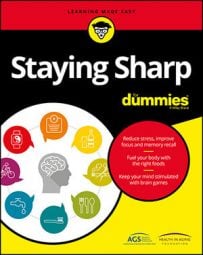Here's more good news: You were probably taught in school that you have all the brain cells you'll ever have at the moment you're born, right? From then on (the lesson continued), you lose about 10,000 brain cells every day — and even more if you drink alcohol.
Well, it turns out that this old wisdom isn't true. You do have an opportunity for dendrite growth. Dendrites are the part of your neurons that branch out to pick up information from other neurons. What you do with your brain determines what happens to it.
Now, for the not-so-good news: Your brain's levels of neurotransmitters — and various hormones, such as melatonin, testosterone, and estrogen — do decline. Your arteries and capillaries grow less flexible and, in some cases, become clogged, hindering the flow of vital oxygen and nutrients to your brain. Uncontrolled stress and high blood pressure make matters only worse.
Reducing stress, keeping the blood flowing
As you age, you want to retain your power to learn and recall — and maybe even get better at those things if you can. If that's your agenda, here are three things to start doing today:- Reduce your stress level.
- Control your blood pressure.
- Improve your blood circulation.
As you age, the blood flow to your brain reduces, especially if your diet is high in saturated fats or if you drink alcohol or smoke. This reduction means that your neurons get less life-sustaining nutritional support. Your blood brings not only the glucose, which acts as fuel to your brain, but also the amino acids that are synthesized into neurotransmitters.
The reduction in blood flow to your brain doesn't necessarily happen at the same pace in your neighbor down the street who's the same age. Despite normal aging changes, you do have some control over it. One of the best things you can do to keep your blood flowing is to exercise on a regular basis. You not only do your heart a big favor but also help clear out cholesterol from your arteries and increase the longevity of the elasticity of your arteries and capillaries.To minimize stress and keep the blood flowing, consider these tips:
- Exercise. Take regular walks, swim, bike, or work out in the gym — whatever fits your style.
- Join a yoga or meditation class.
- Eat a balanced diet. Keep the saturated-fat level low.
- Minimize consumption of alcohol.
- Moderate your caffeine intake.
- Don't smoke.
- Avoid high-stress activities.
- Learn and use relaxation techniques on a regular basis.
The other big targets of free radicals are your dendrites. Dendrites (like tree branches) are the part of your neurons that receive information from other neurons. Free radicals cause your dendrites to thin out (have fewer branches and therefore fewer connections), leaving your brain less able to process information in the ways it had before. You may find yourself forgetting jokes that you were once able to tell with great punch.
One way to combat free radicals is to consume foods that are rich in antioxidants.
Compensating for your graying senses
Although vision and hearing issues often emerge as you get older, these changes don't have to be a burden like they did in years past. With the advent of wonders like eyeglasses, cataract surgery, large-print books, and hearing aids, folks today are much better off than their ancestors were when it comes to the eyes and ears.Of course, picking up important information is more difficult if your vision or hearing isn't in top working order. If you don't get all the information others get, you may remember less.
Other people may misread your visual or hearing deficits as a decline in your overall intelligence. Do everything you can to keep your eyesight strong and your hearing acute so people don't get the wrong idea! Maximize your sensory ability by compensating for any problems you may develop:
- If hearing is the issue, see an audiologist and get a hearing aid if needed. Then use it.
- If your eyesight is the issue, see an optometrist to find out whether you need to wear glasses. The optometrist also screens your eyes and may refer you to an ophthalmologist (medical eye doctor) for treatment if you're developing cataracts, have increased eye pressure (signaling glaucoma), or if you have macular degeneration that needs medical attention.

